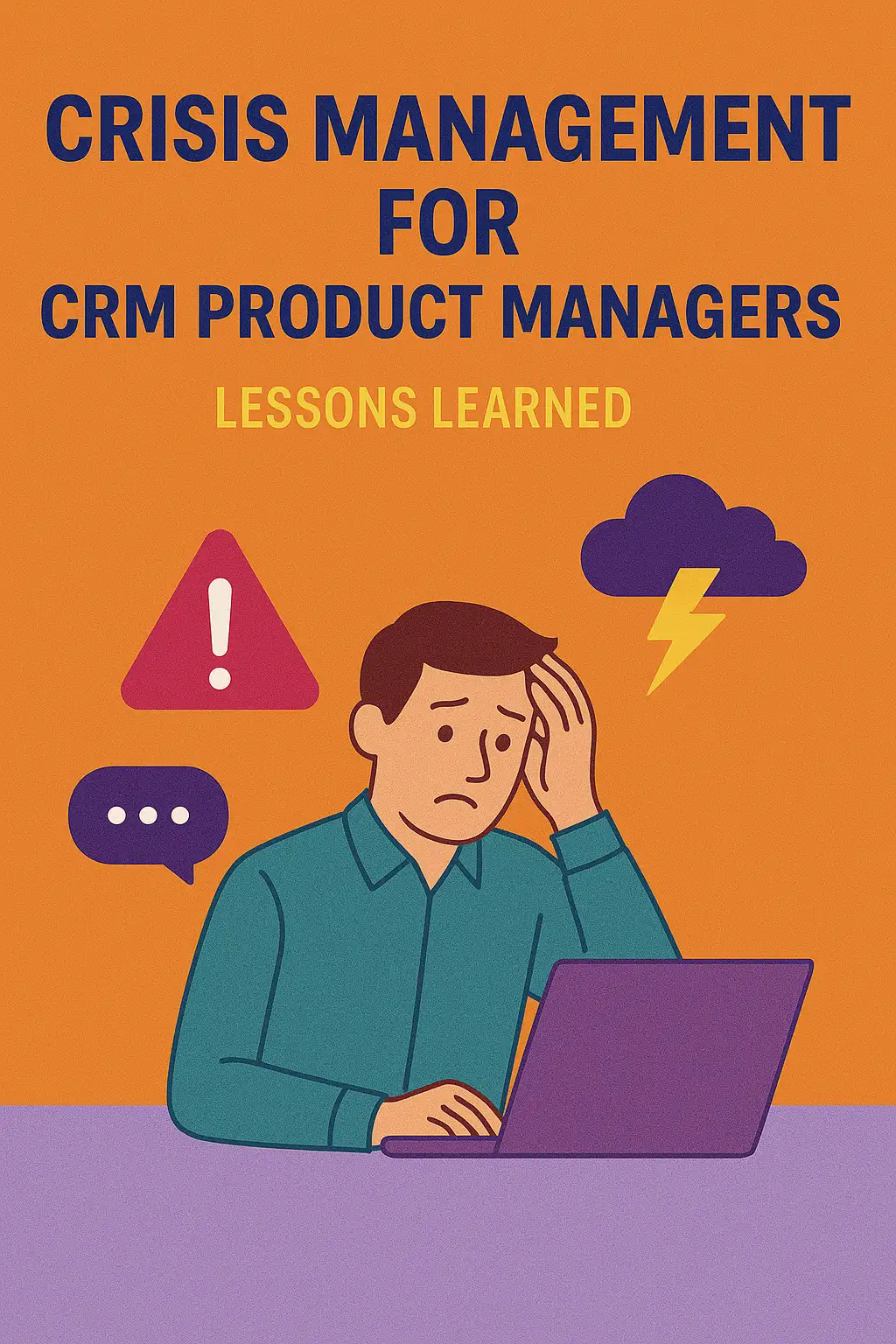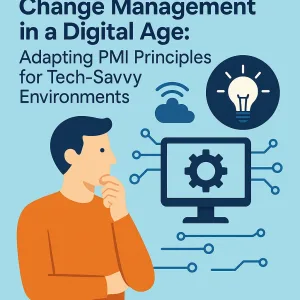Introduction
The role of a CRM (Customer Relationship Management) Product Manager is pivotal. CRM product management involves overseeing the development, implementation, and optimization of CRM systems that facilitate effective customer interactions and enhance business relationships. This role is crucial as it directly impacts customer satisfaction, retention, and ultimately, the organization’s bottom line. A well-executed CRM strategy can lead to improved customer insights, streamlined processes, and increased sales, making it an essential component of any successful business strategy.
However, the journey of a CRM product manager is not without its challenges. Crises can arise from various sources, including technological failures, shifts in market demands, or unexpected changes in customer behavior. In this context, crisis management becomes a vital skill for CRM product managers. It involves preparing for, responding to, and recovering from adverse situations that could disrupt the CRM strategy and affect customer relationships. Effective crisis management ensures that product managers can navigate these challenges, maintain customer trust, and safeguard the organization’s reputation.
This blog post aims to explore the intersection of crisis management and CRM product management. We will delve into the key lessons learned from real-world crises faced by CRM product managers, highlighting strategies for effective crisis response and recovery. By understanding the importance of proactive planning and agile decision-making, product managers can better equip themselves to handle crises and turn potential setbacks into opportunities for growth. Through this discussion, we hope to provide valuable insights that will empower CRM product managers and crisis management professionals to enhance their strategies and foster resilience in their organizations.
Understanding Crises in CRM Management
Crisis management is a critical aspect of a CRM product manager’s role, as they must navigate various challenges that can significantly impact both customer relationships and overall business performance. Here are some key insights into the types of crises that CRM product managers may encounter:
Common Crises in CRM Management
- Data Breaches: Data breaches pose a significant threat to CRM systems, potentially exposing sensitive customer information. Such incidents can lead to loss of customer trust, legal repercussions, and financial penalties. The aftermath often requires extensive communication and remediation efforts to restore confidence among stakeholders [6].
- Customer Dissatisfaction: Issues such as poor service delivery, product failures, or unmet expectations can lead to widespread customer dissatisfaction. This can manifest in negative reviews, increased churn rates, and a tarnished brand reputation. Addressing these concerns promptly is essential to mitigate long-term damage [12].
- System Failures: Technical failures, such as outages or software bugs, can disrupt CRM operations, leading to lost sales opportunities and decreased productivity. These failures can hinder the ability to manage customer interactions effectively, resulting in frustration for both customers and employees [7].
Impact of Crises on CRM Strategies and Business Outcomes
The repercussions of crises extend beyond immediate operational challenges. They can fundamentally alter CRM strategies and influence business outcomes in several ways:
- Reputation Damage: Crises can lead to a loss of customer trust, which is difficult to rebuild. A tarnished reputation can affect customer acquisition and retention, ultimately impacting revenue [12].
- Resource Allocation: During a crisis, resources may need to be diverted to address the issue, which can disrupt ongoing projects and strategic initiatives. This shift can lead to delays in product development and innovation [9].
- Strategic Reevaluation: Crises often necessitate a reevaluation of existing CRM strategies. Product managers may need to adapt their approaches to better align with customer needs and expectations, ensuring that future crises are managed more effectively [10].
Importance of Proactive Crisis Identification
Proactive crisis identification is crucial for CRM product managers. By anticipating potential crises, they can develop strategies to mitigate risks and respond effectively when issues arise. Key steps include:
- Risk Assessment: Conducting regular risk assessments to identify vulnerabilities within the CRM system and customer interactions can help in preparing for potential crises [10].
- Monitoring and Intelligence Gathering: Implementing systems for continuous monitoring of customer feedback and system performance can provide early warning signs of potential crises, allowing for timely intervention [8].
- Crisis Management Planning: Developing a comprehensive crisis management plan that outlines procedures for communication, response, and recovery can ensure that the organization is prepared to handle crises efficiently [3][6].
Real-life Case Studies of CRM Crises
Product managers often face significant challenges that can escalate into crises. Understanding these crises through real-life case studies can provide valuable insights into effective management strategies and lessons learned. Below are notable examples of CRM crises faced by well-known brands, along with an analysis of their responses and the key takeaways.
1. Vodafone’s CRM Implementation Failure
Vodafone encountered significant challenges during its CRM implementation, primarily due to a negative mindset towards customer interactions. The company initially viewed customers as burdens rather than partners, which led to a failure in effectively utilizing CRM tools.
- Response and Management Strategies: Vodafone had to reassess its approach to customer relationships, focusing on changing internal perceptions and improving customer service readiness.
- Key Lessons: A successful CRM strategy requires a customer-centric mindset. Organizations must prioritize understanding and valuing customer relationships to avoid implementation failures [1][13].
2. Cigna’s Customer Care Crisis
Cigna faced a crisis when its customer care department was unprepared to handle customer issues, resulting in a 6% loss of existing customers. This situation highlighted the importance of readiness in CRM strategies.
- Response and Management Strategies: The company recognized the need for better training and resources for its customer care team to effectively manage customer inquiries and issues.
- Key Lessons: Being prepared for change and ensuring that customer service teams are equipped to handle challenges is crucial for maintaining customer loyalty and trust [12].
3. Hershey’s ERP and CRM Integration Failure
Hershey’s experience during the 1999 Halloween season serves as a cautionary tale. The company faced significant disruptions due to a failed ERP and CRM integration, which led to product shortages and delivery issues.
- Response and Management Strategies: Hershey had to quickly pivot its strategy, focusing on improving supply chain management and customer communication to mitigate the fallout from the crisis.
- Key Lessons: Effective integration of CRM with other business systems is essential. Companies must ensure that all systems work cohesively to avoid operational disruptions that can impact customer satisfaction [13].
4. British Airways’ Customer Service Crisis
British Airways experienced a major crisis when a system failure led to the cancellation of thousands of flights, severely impacting customer experience and trust.
- Response and Management Strategies: The airline implemented a comprehensive communication strategy to keep customers informed and offered compensation to affected passengers.
- Key Lessons: Transparent communication during a crisis is vital. Organizations should prioritize keeping customers informed and engaged to maintain trust, even in challenging situations [13].
5. General Motors’ CRM Misalignment
General Motors faced a crisis when its CRM systems failed to align with customer expectations, leading to dissatisfaction and a decline in brand loyalty.
- Response and Management Strategies: The company undertook a thorough review of its CRM processes and customer feedback mechanisms to realign its strategies with customer needs.
- Key Lessons: Continuous evaluation and adaptation of CRM strategies based on customer feedback are essential for long-term success. Organizations must remain agile and responsive to changing customer expectations [13].
Developing a Crisis Management Plan for CRM
Product managers must be prepared to navigate unexpected challenges and crises that can disrupt operations and impact customer relationships. A well-structured crisis management plan (CMP) is essential for ensuring that CRM strategies remain resilient and effective during turbulent times. Here are the key components to consider when developing a CMP tailored for CRM:
Components of an Effective Crisis Management Plan
- Risk Assessment: Begin by identifying potential risks that could impact your CRM strategy. This includes technological failures, data breaches, or shifts in customer expectations. A thorough risk assessment allows product managers to prioritize which risks to address first and develop appropriate response strategies [6].
- Crisis Response Protocols: Establish clear protocols that outline the steps to be taken during a crisis. This should include specific actions for different types of crises, such as how to handle a data breach or a significant drop in customer satisfaction. Assign roles to key personnel to ensure a coordinated response [7][10].
- Communication Strategies: Effective communication is critical during a crisis. Develop a communication plan that details how information will be disseminated to stakeholders, including customers, team members, and upper management. Transparency is key; ensure that stakeholders are kept informed about the situation and the steps being taken to resolve it [6][12].
- Recovery Procedures: Outline the steps necessary to recover from a crisis and restore normal operations. This includes strategies for regaining customer trust and ensuring that CRM systems are back online and functioning effectively. Recovery procedures should also address how to learn from the crisis to prevent future occurrences [6][8].
The Role of Communication and Stakeholder Engagement
Communication plays a pivotal role in crisis management. Product managers must ensure that all stakeholders are engaged and informed throughout the crisis. This involves:
- Regular Updates: Provide timely updates to stakeholders about the status of the crisis and the actions being taken. This helps to build trust and maintain confidence in the CRM strategy [9].
- Feedback Mechanisms: Establish channels for stakeholders to provide feedback during a crisis. This can help identify areas of concern and improve the response strategy in real-time [12].
- Post-Crisis Review: After the crisis has been resolved, conduct a review with stakeholders to discuss what worked, what didn’t, and how the crisis management plan can be improved for future incidents [5].
Importance of Training and Simulations
Training and simulations are vital for ensuring that the crisis management plan is effective. Product managers should:
- Conduct Regular Training Sessions: Ensure that all team members are familiar with the crisis management plan and their specific roles within it. Regular training helps to reinforce the importance of preparedness and builds confidence in the team’s ability to respond [5][10].
- Run Simulations: Organize crisis simulations to practice the response protocols in a controlled environment. This allows the team to identify gaps in the plan and make necessary adjustments before a real crisis occurs [5][6].
- Evaluate Performance: After simulations, evaluate the team’s performance and gather feedback to refine the crisis management plan further. Continuous improvement is essential for maintaining an effective response strategy [5][6].
Crisis Response Strategies for CRM Product Managers
Particularly for CRM product managers, the ability to navigate crises effectively is paramount. Crises can arise from various sources, including technical failures, customer dissatisfaction, or unexpected market changes. Here are some actionable strategies that can enhance crisis response for CRM product managers:
Importance of Quick Decision-Making and Flexibility
- Rapid Response: In a crisis, the speed of decision-making can significantly impact the outcome. CRM product managers must be prepared to make swift, informed decisions that address immediate issues while considering long-term implications. This requires a blend of rational analysis and quick thinking, as decisions made during crises often carry ethical considerations and potential ramifications [3].
- Adaptability: A flexible crisis management plan is crucial. It should evolve based on lessons learned from past incidents, allowing teams to adapt their strategies as new challenges arise. Continuous improvement ensures that the response strategy remains effective and relevant [8].
Role of Cross-Functional Teams in Crisis Response
- Collaboration Across Departments: Establishing a crisis management team that includes stakeholders from various departments is essential. This team should consist of individuals with diverse expertise, such as communications, IT, and customer support, to ensure a well-rounded approach to crisis management [6].
- Clear Roles and Responsibilities: Assigning specific roles within the crisis management team helps streamline decision-making and enhances accountability. Each member should understand their responsibilities, whether they are decision-makers, communicators, or operational leads, to facilitate a coordinated response [2].
Effective Communication During a Crisis
- Transparent Messaging: During a crisis, clear and transparent communication is vital. CRM product managers should develop a crisis communication plan that outlines how information will be shared with stakeholders, including customers and team members. This plan should prioritize reassurance and transparency to maintain trust [15].
- Real-World Examples: Learning from past crises can provide valuable insights into effective communication strategies. For instance, companies that have successfully navigated crises often emphasize the importance of timely updates and empathetic messaging to address customer concerns and maintain brand integrity [12].
Post-Crisis Evaluation and Learning
Crises can arise unexpectedly, impacting both the product and its users. Conducting a thorough post-crisis evaluation is essential for product managers to not only address the immediate fallout but also to foster continuous improvement in their strategies. Here are key steps and considerations for effective post-crisis evaluation:
- Conduct a Comprehensive Review: Begin by gathering your crisis management team to review the events leading up to, during, and after the crisis. This should include a detailed analysis of the crisis’s impact on your CRM strategy, customer relationships, and overall business objectives. Identifying the root causes of the crisis is crucial for understanding what went wrong and how to prevent similar issues in the future [3][11].
- Document Lessons Learned: It is vital to create a structured document that captures insights gained from the crisis. This should include what strategies were effective, what failed, and the rationale behind decisions made during the crisis. By documenting these lessons, you can create a reference for future crises and ensure that knowledge is retained within the organization [10][12].
- Implement Changes: Based on the lessons learned, develop an action plan to implement necessary changes in your CRM strategy. This may involve revising your crisis management plan, enhancing communication protocols, or adjusting product features to better meet customer needs during challenging times. Ensuring that these changes are actionable and measurable will help in tracking their effectiveness [4][8].
- Build Resilience and Adaptability: Emphasizing resilience in your CRM strategy is essential. This involves not only preparing for potential crises but also fostering a culture of adaptability within your team. Encourage team members to be proactive in identifying potential risks and developing contingency plans. A resilient CRM strategy can better withstand crises and adapt to changing market conditions, ultimately leading to improved customer trust and loyalty [6][9].
- Conduct Regular Post-Crisis Reviews: Make post-crisis evaluations a regular part of your product management process. By routinely assessing your responses to crises, you can continuously refine your strategies and enhance your team’s preparedness for future challenges. This ongoing evaluation process will contribute to a culture of learning and improvement within your organization [11][14].
By focusing on these key points, CRM product managers can effectively navigate the complexities of crisis management, ensuring that their strategies not only survive crises but emerge stronger and more resilient.
Conclusion
Effective crisis management is not just a reactive measure but a crucial component of strategic planning. The ability to navigate challenges and crises can significantly impact customer relationships and overall business success. Here are the key takeaways to consider:
- Importance of Crisis Management: Crisis management plays a vital role in CRM product management by ensuring that product managers are equipped to handle unexpected challenges. A well-prepared strategy can mitigate risks, maintain customer trust, and preserve brand reputation during turbulent times. Recognizing the potential for crises and understanding their implications on customer relationships is essential for any CRM product manager.
- Proactive Approach to Crisis Preparedness: It is imperative for product managers to adopt a proactive stance towards crisis management. This involves not only having contingency plans in place but also regularly reviewing and updating these strategies based on evolving market conditions and customer feedback. By anticipating potential issues and preparing for them, product managers can respond swiftly and effectively, minimizing disruption and maintaining customer satisfaction.
- Sharing Experiences and Strategies: The journey of crisis management is often enriched by shared experiences. We encourage readers to reflect on their own encounters with crises in CRM strategy and to share their insights and strategies with the community. Engaging in discussions about best practices and lessons learned can foster a collaborative environment where product managers can learn from one another and enhance their crisis management capabilities.
In conclusion, embracing a proactive approach to crisis management not only prepares CRM product managers for unforeseen challenges but also strengthens their overall strategy, ensuring long-term success in managing customer relationships.
Find out more about Shaun Stoltz https://www.shaunstoltz.com/about/.
This post was written by an AI and reviewed/edited by a human.



